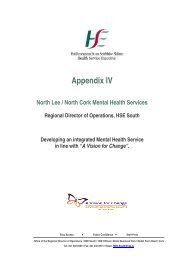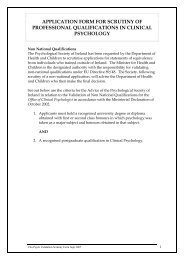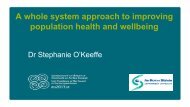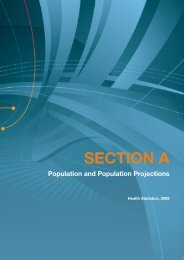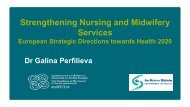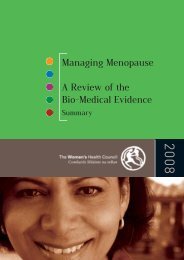All Ireland Traveller Health Study Our Geels - Department of Health ...
All Ireland Traveller Health Study Our Geels - Department of Health ...
All Ireland Traveller Health Study Our Geels - Department of Health ...
Create successful ePaper yourself
Turn your PDF publications into a flip-book with our unique Google optimized e-Paper software.
<strong>Health</strong> Survey Findings<br />
Replication and Expansion <strong>of</strong> the PHCTP<br />
During the last 15 years, the Pavee Point Primary <strong>Health</strong> Care for <strong>Traveller</strong>s Project has demonstrated<br />
that this model can help to significantly improve Primary <strong>Health</strong> Care for <strong>Traveller</strong>s. As a result, other<br />
<strong>Traveller</strong> organisations have decided to replicate this type <strong>of</strong> Project with their own local health service<br />
provider. There are now 40 Primary <strong>Health</strong> Care for <strong>Traveller</strong> Projects at varying stages <strong>of</strong> development,<br />
located around the country.<br />
The model involves enabling individuals and organisations to improve health through informed health<br />
care, self-help and mutual aid. It means encouraging and supporting local initiatives for health. Crucially<br />
it is a flexible system that can be adapted to the health problems, the culture or ‘way <strong>of</strong> life’, and the<br />
stage <strong>of</strong> development reached by the community. Design and implementation <strong>of</strong> successful PHCTPs is<br />
determined through a process that values empowerment, partnership and advocacy, allowing partners<br />
to highlight inequity and negotiate solutions.<br />
Through using community development principles PHCTP has facilitated community participation by<br />
building capacity and supporting the community to identify and address health issues. This approach<br />
has empowered individuals to enhance skills, take control and participate in decisions that affect their<br />
lives in order to address the health <strong>of</strong> their community.<br />
‘This is the first time <strong>Traveller</strong>s have got this type <strong>of</strong> training and job. We understand our own people and<br />
believe that given the proper support and resources we can begin to improve the health <strong>of</strong> our community. It<br />
is no longer acceptable that only two out <strong>of</strong> every 100 <strong>Traveller</strong>s lives to 65 years <strong>of</strong> age’<br />
Missie Collins, Community <strong>Health</strong> Worker, at the launch <strong>of</strong> the Primary <strong>Health</strong> Care for<br />
<strong>Traveller</strong>s Report by Mr. Michael Noonan, T.D., Minister for <strong>Health</strong>. 12th June 1996<br />
Measures <strong>of</strong> Overcoming Barriers to <strong>Health</strong> Promotion and<br />
<strong>Health</strong>care for Minority Populations: International Experience<br />
There is a strong international literature on the health needs <strong>of</strong> minority groups ranging for example<br />
from the Inuits <strong>of</strong> Canada (Young, 2003; 2005; <strong>Health</strong> Council <strong>of</strong> Canada, 2005), the Aboriginals and<br />
Maoris <strong>of</strong> Australia and New Zealand (Carson et al., 2007; Davis et al., 2006; Anderson et al., 2006; Pincock,<br />
2008) Blacks, Hispanics and Native Americans in the United States (Rhoades, 2003; Roubideaux, 2005;<br />
Kaufman et al., 1998) and South America, immigrant Asian and West Indian populations in the United<br />
Kingdom (Davey-Smith et al., 2000; Smaje and Le Grand, 1997), and Roma and Gypsy populations in<br />
Europe (Parry et al., 2007; Cemlyn, 2009; Vokó et al., 2009; Haji<strong>of</strong>f and McKee, 2000). Indeed the Irish in<br />
Britain and the US have been documented extensively also (Clucas, 2009; Kelleher et al., 2006; Scally,<br />
2004; Garrett, 2002; Abbotts et al., 1997). This literature concerns itself with several aspects <strong>of</strong> catering<br />
equitably for distinctive groups and individuals across society. At the level <strong>of</strong> provision <strong>of</strong> services,<br />
barriers may be encountered such as language and norms <strong>of</strong> behaviour. <strong>Health</strong>care providers may<br />
fail to appreciate nuances <strong>of</strong> understanding that lead to an inadequate treatment experience. Access<br />
may be impeded by resources, eligibility and means <strong>of</strong> payment. Cultural aspects such as family and<br />
social support and the differing needs <strong>of</strong> men and women are all considerations. Practicalities in<br />
27






